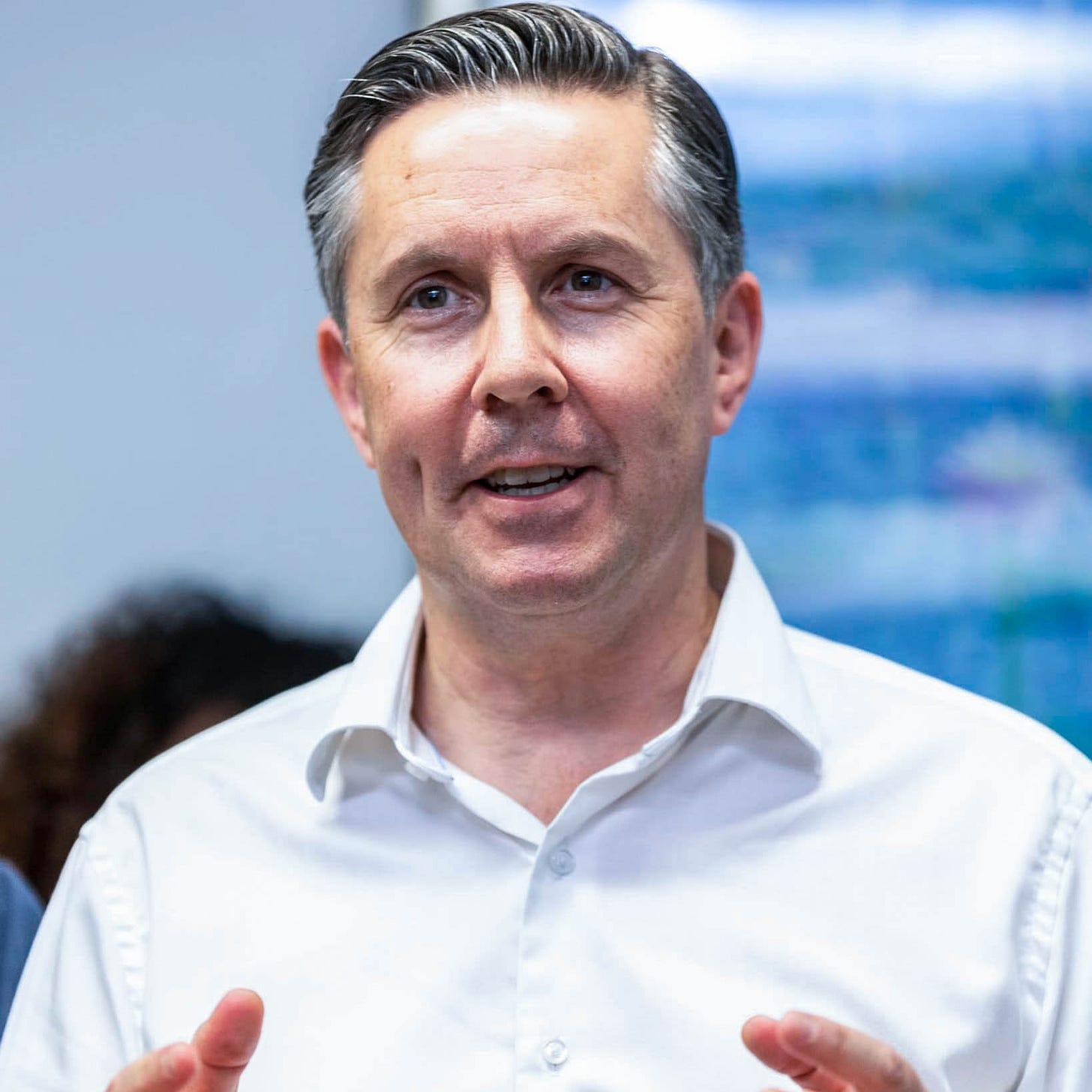Health Minister Vows Crackdown on Illegal Tobacco as Black Market Threatens Anti-Smoking Goals
Today’s Article is brought to you by Empower your podcasting vision with a suite of creative solutions at your fingertips.
This piece is freely available to read. Become a paid subscriber today and help keep Mencari News financially afloat so that we can continue to pay our writers for their insight and expertise.
Health Minister Mark Butler warned retailers selling illicit cigarettes Wednesday they will be tracked down and prosecuted in greater numbers as the government escalates its fight against a black market it says threatens Australia’s world-leading tobacco control efforts.
Speaking in Adelaide, Butler said the illegal tobacco trade is funding organized crime and undermining efforts to drive smoking rates to zero by 2030.
“So to those retailers out there who know they are doing the wrong thing, I want to just echo what Andrea and Julian have said. We will track you down. We will start to prosecute you in much greater numbers, confiscate the profits that you’re making from this illicit activity, and you will not get away with what you are doing,” Butler said.
The minister’s stark warning comes as illegal cigarettes flood Australian stores, with criminal gangs importing cheap overseas products and using the profits to finance violent crime. South Australia has emerged as a national leader in enforcement, with other states now following its model.
Truth matters. Quality journalism costs.
Your subscription to Mencari directly funds the investigative reporting our democracy needs. For less than a coffee per week, you enable our journalists to uncover stories that powerful interests would rather keep hidden. There is no corporate influence involved. No compromises. Just honest journalism when we need it most.
Not ready to be paid subscribe, but appreciate the newsletter ? Grab us a beer or snag the exclusive ad spot at the top of next week's newsletter.
Butler rejected suggestions that tobacco excise increases have driven consumers to the black market, instead blaming global oversupply and organized crime control of distribution networks.
Not a Victimless Crime
The Health Minister emphasized that purchasing cheap cigarettes or flavored vapes directly funds serious criminal activity.
“This is not a victimless crime. Obviously, you are punching a hole in a very important public health program, but you are also handing over money to serious organised crime to bankroll the sorts of activities that Julian said,” Butler told reporters.
He said illicit tobacco is undermining Australia’s ability to meet smoking reduction targets outlined in the government’s 2030 plan.
“Tobacco is punching a very serious hole in our ability to get down to the smoking levels that we have in our 2030 plan and beyond that to stamp out smoking altogether,” Butler said.
Assistant Minister Julian Hill reinforced the message about consumer responsibility in funding organized crime.
“The choices that you’re making buying cheaper smokes or flavoured vapes is funding the gamut of violent crime and trafficking that we’re seeing, and we don’t want to destroy the fabric of our country,” Hill said.
Excise Debate Intensifies
Butler faced questions about whether tobacco excise increases have pushed consumers toward illegal products, with NSW Premier Chris Minns reportedly raising concerns about the connection between high taxes and black market growth.
The Health Minister defended the government’s position, pointing to international evidence that illicit tobacco exists regardless of legal cigarette prices.
“I think the point to make is the one that the Assistant Minister made, which is that illicit tobacco is seen in every single tobacco market in the world, no matter what the legal price of cigarettes is,” Butler said.
He cited the United States as an example of a market with cheaper legal cigarettes that still faces significant black market challenges.
“If you look at the United States, for example, which has much cheaper legal cigarettes because of a lower rate of taxation, they also have a very significant challenge with black market cigarettes as well,” Butler said.
Previous Government’s Excise Increases
Butler noted that the largest excise increases occurred under previous Coalition governments, not under the current Labor administration.
“I also make the point that the very big increases in excise happened last decade during the life of the Abbott, then Turnbull, then Morrison governments where excise increased by well over 200%,” he said. “Compare that to the relatively modest increases that have happened over the last three to four years.”
He attributed the explosion in illicit tobacco to global market conditions rather than Australian tax policy.
“The explosion in illicit tobacco was, as the Assistant Minister said, a product of significant oversupply in the world, dumping of this product on every single country around the world by these gangs that are controlling this traffic, and essentially the stranglehold that some criminal gangs here in Australia have got over the market to bankroll their other criminal activities,” Butler said.
Premier’s Concerns Addressed
Asked whether he should have listened better to state premiers like Minns, who said he was met with suggestions that excise is not contributing to black market growth, Butler said he has been engaging with state leaders.
“I was listening to state premiers and to state health ministers. We’ve had two significant discussions as a group of health ministers about this and that discussion has focused very much on the importance of enforcement,” he said.
Butler praised South Australia’s nation-leading enforcement work, which NSW and other states are now adopting.
“The nation-leading work that South Australia is undertaking here, which is now being picked up increasingly around the country, including by the New South Wales Government, that has seen the results that Andrea and her Government have been able to achieve here with the work of the Commissioner and his staff and police officers,” he said.
Public Health Perspective
Butler said cigarette prices remain the most effective tool for reducing smoking rates while acknowledging the need to control the illicit market.
“We recognise from a public health perspective that the price of cigarettes is probably the most important tool in the toolbox to drive down smoking rates in our community. But of course, we’ve got to get some control over an illicit market that is seeking to circumvent all of the legal protections that consumers have in place here,” he said.
The minister dismissed industry calls for excise reduction, questioning what rate would make illegal tobacco uncompetitive.
“These cigarettes that are being sold by criminal gangs from a massively oversupplied illegal market overseas, as Julian said, are producing cigarettes for $2 a packet. I mean, what is the reduction in excise that the people proposing that reduction, who are essentially people from the tobacco industry and the retail sector that supports that industry, what are they proposing is the rate at which illicit tobacco becomes essentially uncompetitive with a legal product,” Butler said.
He said no excise reduction could compete with the prices criminal gangs offer.
“There is just no rate of reduction you could put in place to out-price these cheap cigarettes that are flooding in from overseas, organised by criminal gangs,” Butler said.
Policy Independence
Butler vowed that public health policy will not be dictated by organized crime or tobacco industry interests.
“We will do the right thing from a public health perspective. We’re not going to have our public health policies dictated by organised crime or by big tobacco. The job here now is to enforce the good laws we have in place against the bad people who are flouting them,” he said.
When asked whether consumers care where their money goes when purchasing cheap tobacco, Butler said the focus is not on buyers.
“Look, I’m not focused on consumers. I’m focused on the people who are selling these things. We’re focused on the gangs who are controlling this market. We’re focused on the retailers who might think that this is somehow victimless crime that they’re profiting from,” he said.
Criminal Activity Warning
Butler reiterated to retailers that selling illicit tobacco funds serious criminal enterprises.
“I say again to them it is not. It is bankrolling very serious criminal activity, often violent activity, that has very serious victims involved,” he said.
The minister said enforcement, not consumer targeting, has been the strategy since tobacco control laws were updated.
“We’ve made a point from the time we started to update our tobacco control laws a few years ago and take serious action against vaping, we were not targeting consumers. We are targeting the people who control this market,” Butler said.
Multi-Agency Approach
Hill stressed the complexity of addressing the black market, calling it a global issue requiring partnerships across jurisdictions.
“This is a global issue. There’s no one single solution. It’s not simple. And it really requires good partnerships with states and territories,” Hill said.
He said significant effort is underway across multiple agencies handling different aspects of supply and demand.
“We have people in law enforcement, people in health, people in commercial business regulation. We have people at the border, we have people internationally. I want to thank all of the individuals that work in those jobs that are working really hard on this multi-layered complex issue,” Hill said.
Hill acknowledged the crackdown will take time and requires coordination.
“This will take time. This requires coordinated multi-agency effort. That’s what my job is here to do, to centralise a cohesive, unified national effort. We bring together the powers of all of the agencies working on this so we can really make a dent in this problem,” he said.
Biggest Threat to Tobacco Control
Butler characterized the black market as the greatest challenge facing Australia’s tobacco control programs.
“I think from a public health perspective it is now the biggest threat to our world leading tobacco control programs. I mean we’ve been undertaking this work as a country for 50 years and in so many ways we’ve led the world and that’s why we have some of the lowest rates of smoking in the developed world right now,” he said.
He cited Australia’s history of tobacco control measures, from advertising bans to plain packaging reforms.
“Whether it was taking on advertising, taking on sports sponsorship, leading the world with our plain packaging reforms that we initiated when we were last in government. You know this is all very hard work,” Butler said.
The minister acknowledged the challenges of fighting both addiction and industry tactics.
“Firstly, you’re dealing with a highly, highly addictive product that’s very hard for people to kick. Secondly, you’re dealing with a very rich industry, the big tobacco industry, that’s determined to use every tactic they can to get around these laws,” he said.
Path to Zero Smoking
Butler said illicit products flooding developed markets worldwide threaten efforts to eliminate smoking entirely.
“The sorts of products you’re seeing in front of me, flooding our market, flooding other developed markets all around the world, right now, I think the biggest threat we have to go that last mile and get from where we are now, a bit under 10% of adults daily smoking, down to zero, which is where we want to be,” he said.
South Australia has implemented some of the country’s toughest penalties, with fines reaching $6.6 million for those caught selling or possessing illegal tobacco products. The state’s enforcement model is now being replicated across Australia as authorities intensify their crackdown on the black market trade.
Sustaining Mencari Requires Your Support
Independent journalism costs money. Help us continue delivering in-depth investigations and unfiltered commentary on the world's real stories. Your financial contribution enables thorough investigative work and thoughtful analysis, all supported by a dedicated community committed to accuracy and transparency.
Subscribe today to unlock our full archive of investigative reporting and fearless analysis. Subscribing to independent media outlets represents more than just information consumption—it embodies a commitment to factual reporting.
As well as knowing you’re keeping Mencari (Australia) alive, you’ll also get:
Get breaking news AS IT HAPPENS - Gain instant access to our real-time coverage and analysis when major stories break, keeping you ahead of the curve
Unlock our COMPLETE content library - Enjoy unlimited access to every newsletter, podcast episode, and exclusive archive—all seamlessly available in your favorite podcast apps.
Join the conversation that matters - Be part of our vibrant community with full commenting privileges on all content, directly supporting The Evening Post (Australia)
Catch up on some of Mencari’s recent stories:
It only takes a minute to help us investigate fearlessly and expose lies and wrongdoing to hold power accountable. Thanks!








